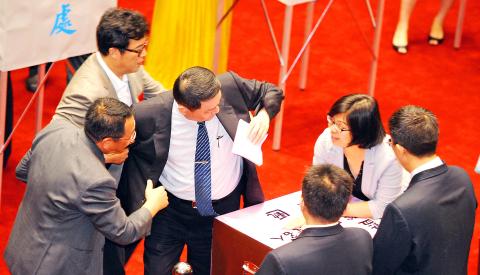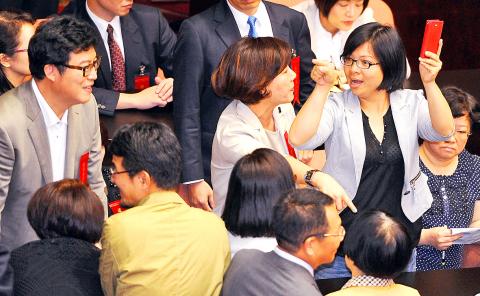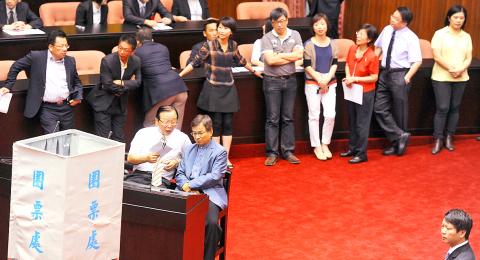An opposition blockade yesterday kept the legislature from voting on the nominations for Control Yuan members on the final day of the extraordinary legislative session after the Chinese Nationalist Party (KMT) reportedly decided to monitor its legislators’ votes to ensure they toed the party line, bringing an early end to the day’s meeting.
The Legislative Yuan had been scheduled to vote in the morning on the two nominees for president and vice president of the government watchdog and vote in the afternoon on the other nominees.
After Legislative Speaker Wang Jin-pyng (王金平) announced the start of voting, Democratic Progressive Party (DPP) lawmakers asked their KMT colleagues not to show their marked ballots to the party’s ballot overseer or other KMT lawmakers and also asked for cross-party negotiation.

Photo: Liu Hsin-de, Taipei Times
When the KMT did not respond to their requests, the DPP legislators created a roadblock by lining up to receive the ballot papers, but refusing to actually accept them and cast a vote.
From 9am to 11am — when the morning vote was scheduled to end — KMT, DPP and Taiwan Solidarity Union (TSU) legislators exchanged heated barbs in a confrontation that came close to a physical altercation.
DPP Legislator Yu Mei-nu (尤美女) said the KMT had intended to divide its lawmakers into groups of four and each group was to vote simultaneously at the four ballot boxes so they could “monitor each other’s votes.”

Photo: Liu Hsin-de, Taipei Times
While the DPP and the TSU had been the ones to initiate the blockade, not all KMT legislators were happy with their caucus’ call to push through the nominations.
“I personally think that as the roster of Control Yuan nominees this time has been widely criticized, the party should leave it to lawmakers themselves to exercise their own judgement… If the party insists on a ‘yes’ vote, the party’s prospects in the year-end elections will be greatly impacted,” KMT Legislator Chen Ken-te (陳根德) said.
KMT Legislator Lu Hsueh-chang (呂學樟) called the restriction “an insult to the lawmakers’ integrity” and the showing of marked ballots “a violation of the law.”

Photo: Liu Hsin-de, Taipei Times
The KMT and DPP held press conferences after the morning’s imbroglio. At its press conference, the KMT caucus fumed over what it said was yet another obstruction of legislative procedure by the DPP, claiming that the DPP’s interference violated Article 142 of the Criminal Code, which stipulates that “a person who … interferes with another in the free exercise of his right to vote … shall be sentenced to imprisonment for not more than five years.”
The caucus said the KMT would take legal action against DPP lawmakers.
KMT caucus deputy secretary Alex Fai (費鴻泰) said his party would call for a second extra session to vote on the Control Yuan nominations. He said the second session would be scheduled to start on July 28.
“If the second extra session does not work, there will definitely be a third or a fourth one,” Fei said.
However, the DPP said the KMT has been trying to use party discipline to “ram through the worst nominations” in Control Yuan history and refused to promise to allow a clean, supervision-free vote
DPP lawmakers cited the Criminal Code as well at their press conference.
The KMT was guilty of “procuring an incorrect result from voting or altering election returns by fraud or other illegal means,” a violation of Article 146 of the Criminal Code, and of Article 148, which prohibits a person prying into the content of a secret ballot, Yu said.
DPP Legislator Hsiao Bi-khim (蕭美琴), the caucus secretary-general, said that during cross-party negotiations last week the KMT had agreed not to oversee its lawmakers’ votes or have them show their marked ballots.
The DPP’s “technical hindrance” was simply a response to the KMT’s breach of that tacit agreement, she said.
DPP caucus director-general Tsai Chi-chang (蔡其昌) questioned the KMT’s right to accuse the opposition of violating the law and the Constitution over the nominations, reminding the KMT that it had former president Chen Shui-bian’s (陳水扁) Control Yuan nominations for as long as three years.
“We are undaunted by the KMT’s threat of a lawsuit,” Tsai said.
The KMT and its chairman, President Ma Ying-jeou (馬英九), should leave the legislature to deliberate the nominations rationally, Tsai said.

Right-wing political scientist Laura Fernandez on Sunday won Costa Rica’s presidential election by a landslide, after promising to crack down on rising violence linked to the cocaine trade. Fernandez’s nearest rival, economist Alvaro Ramos, conceded defeat as results showed the ruling party far exceeding the threshold of 40 percent needed to avoid a runoff. With 94 percent of polling stations counted, the political heir of outgoing Costa Rican President Rodrigo Chaves had captured 48.3 percent of the vote compared with Ramos’ 33.4 percent, the Supreme Electoral Tribunal said. As soon as the first results were announced, members of Fernandez’s Sovereign People’s Party

EMERGING FIELDS: The Chinese president said that the two countries would explore cooperation in green technology, the digital economy and artificial intelligence Chinese President Xi Jinping (習近平) yesterday called for an “equal and orderly multipolar world” in the face of “unilateral bullying,” in an apparent jab at the US. Xi was speaking during talks in Beijing with Uruguayan President Yamandu Orsi, the first South American leader to visit China since US special forces captured then-Venezuelan president Nicolas Maduro last month — an operation that Beijing condemned as a violation of sovereignty. Orsi follows a slew of leaders to have visited China seeking to boost ties with the world’s second-largest economy to hedge against US President Donald Trump’s increasingly unpredictable administration. “The international situation is fraught

MORE RESPONSIBILITY: Draftees would be expected to fight alongside professional soldiers, likely requiring the transformation of some training brigades into combat units The armed forces are to start incorporating new conscripts into combined arms brigades this year to enhance combat readiness, the Executive Yuan’s latest policy report said. The new policy would affect Taiwanese men entering the military for their compulsory service, which was extended to one year under reforms by then-president Tsai Ing-wen (蔡英文) in 2022. The conscripts would be trained to operate machine guns, uncrewed aerial vehicles, anti-tank guided missile launchers and Stinger air defense systems, the report said, adding that the basic training would be lengthened to eight weeks. After basic training, conscripts would be sorted into infantry battalions that would take

GROWING AMBITIONS: The scale and tempo of the operations show that the Strait has become the core theater for China to expand its security interests, the report said Chinese military aircraft incursions around Taiwan have surged nearly 15-fold over the past five years, according to a report released yesterday by the Democratic Progressive Party’s (DPP) Department of China Affairs. Sorties in the Taiwan Strait were previously irregular, totaling 380 in 2020, but have since evolved into routine operations, the report showed. “This demonstrates that the Taiwan Strait has become both the starting point and testing ground for Beijing’s expansionist ambitions,” it said. Driven by military expansionism, China is systematically pursuing actions aimed at altering the regional “status quo,” the department said, adding that Taiwan represents the most critical link in China’s